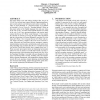Free Online Productivity Tools
i2Speak
i2Symbol
i2OCR
iTex2Img
iWeb2Print
iWeb2Shot
i2Type
iPdf2Split
iPdf2Merge
i2Bopomofo
i2Arabic
i2Style
i2Image
i2PDF
iLatex2Rtf
Sci2ools
103
click to vote
NSPW
2006
ACM
2006
ACM
E-Prime for security: a new security paradigm
This paper details a true and striking paradigm shift: the use of E-Prime for (at least) user-centered security, organizational/enterprise security policies and informal security policy modeling. In 1965, D. David Bourland, Jr. proposed E-Prime as an addition to Korzybski’s General Semantics. Bourland defined E-Prime as that proper subset of the English language that omits any forms of the verb “to be.” E-Prime seems desirable because two forms of the verb “to be” have structural problems with security implications that the use of E-Prime would eliminate. I first examine the rationale for E-Prime (reviewing the Sapir-Whorf hypothesis and the relevant parts of General Semantics), and then cover the basics of E-Prime. Next I examine the use of E-Prime with several “before and after” examples in the areas of user-centered security (Microsoft and ZoneAlarm software messages), organizational/enterprise security policy, and informal security policy modeling (including some e...
Related Content
| Added | 14 Jun 2010 |
| Updated | 14 Jun 2010 |
| Type | Conference |
| Year | 2006 |
| Where | NSPW |
| Authors | Steven J. Greenwald |
Comments (0)

